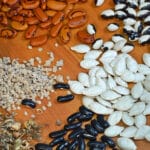What are Heirloom Seeds? (And Why it Matters)
Have you thought about using heirloom seeds in your garden, but weren’t sure why you should use them? We’ll explain what makes heirloom varieties special, why it matters, and pros and cons of heirloom seeds for the home garden.
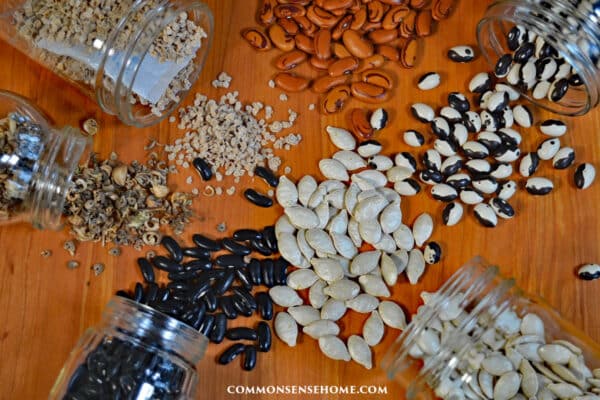
What are Heirloom Seeds?
Many heirloom seeds are literally family heirlooms. These heirloom seed varieties have often been passed down through generations in a family or community. This allows them to adapt their DNA to the local conditions.
Most people use the term for varieties over 50 years old, or those developed before World War II. Some groups trace the history of the plant to show that it’s been handed down.
Often these heirloom plants come with stories. Grandpa Ott’s morning glories inspired the creation of Seed Savers Exchange. The Mortgage Lifter heirloom tomato variety helped pay off the breeder’s mortgage.
For a listing of our favorite seeds sources, check out “Best Heirloom Seed Companies“.
Open Pollinated vs Heirloom
All heirloom seeds are open pollinated, but not all open pollinated seeds are heirlooms. Open pollinated plants pass pollen naturally – by wind, insects, birds, etc.
All heirloom seeds are open pollinated varieties that grow True to Type. This means that when properly isolated from other varieties, they breed true to the parent plant. This makes them an excellent choice for seed saving. These seeds have stood the test of time.
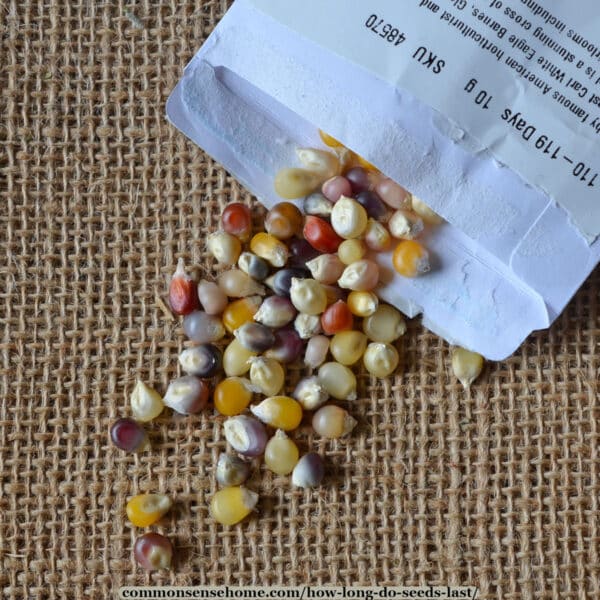
Some vegetable seeds are open-pollinated seeds that breed true to type, but are not heirlooms because they have not been around a long time.
One example of this is Nutribud broccoli. Alan Kapulur developed Nutribud, my favorite broccoli, in the 1990s. (Kapulur is a plant breeding genius. Swanlake melon is another delicious OP variety from Kapulur.)
What’s the Difference Between Hybrid and Heirloom Seeds?
Hybrid seeds are those that are deliberately cross pollinated to produce certain traits. They are a cross between two or more different varieties, while heirloom seeds are from a single variety.
Why do seeds companies sell so many hybrid seeds?
Generally, hybrids are bred for disease resistance, higher yields, uniform appearance, and durability. These traits are useful for farmers and commercial growers. If you have a pest or disease problem, a hybrid might be the right answer while you work to improve overall garden health.
I choose hybrids when I’m not planning to save seeds, and I want a specific trait. For instance, Tiara hybrid cabbages are small and mature quickly, so I use them for succession planting. I plant large heirloom cabbage varieties for my main fall harvest.
Non GMO Heirloom Seeds
Because heirlooms pollinate naturally, they are never genetically modified organisms (GMO). This means that all heirloom seeds are non GMO.
GMO seeds are changed at a genetic level, introducing material from unrelated organisms that would never naturally cross breed. Currently, the only genetically modified garden crops are corn, potatoes, summer squash, and soybeans.
GMO corn usually contains genetic material from Bt bacteria, turning the entire corn plant into pesticide. I don’t know about you, but I would prefer not to eat pesticide.
“Hybrid” does not mean genetically modified. Most hybrid crops are bred the old fashioned way, with two plant varieties mixing pollen.
Advantages of Heirloom and Open Pollinated Seeds
There are many reasons to choose heirloom seeds. These are a few of the advantages.
1. Amazing Flavor
The main reason I choose heirloom seeds is flavor. These varieties capture the flavors I remember from my childhood. Grocery store produce is bland by comparison, focused on durability and uniformity.
Would you like to save this?
My garden hosts produce that is sharp and spicy, mellow and sweet, and everything in between. Tomatoes “pop” with bright acidity, melons are so fragrant I can tell by the aroma when they are ripe. It’s a feast for the senses.
2. Better Nutrition
Heirloom varieties often pack more nutrients than commercial produce. To maximize nutrition, include a range of colors for different antioxidants. Focus on building healthy soil. If the nutrients are not bioavailable in the soil, your plants can’t gather them up.
Include some varieties that are slow to mature, so they have plenty of time to gather nutrients.
3. Preserve Genetic Diversity
Choosing heirlooms helps to preserve genetic diversity. The Seed Trade Census, published each year by Seed Savers Exchange, tracks seed availability. In 2020, only 14% of vegetable varieties were offered by five or more companies. The best way to save these seeds is to grow these seeds.
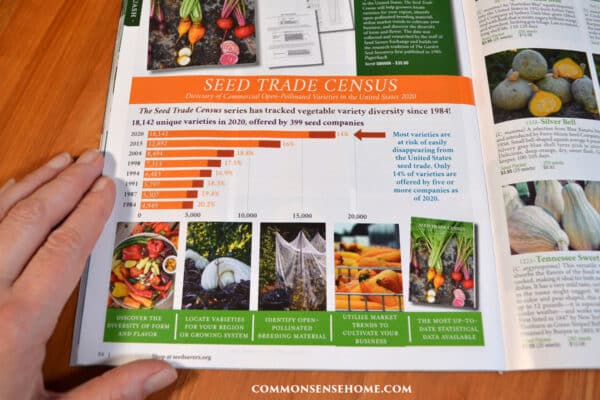
The book “Heirloom Vegetables: A Home Gardener’s Guide to Finding and Growing Vegetables from the Past” has gorgeous photos of many heirloom vegetables. It’s an older book, so used copies are inexpensive. I love the stories and history that comes with these seeds.
4. Help Small Farmers
Many companies that sell heirloom vegetable seeds source them from small family farms, helping to keep them in business. Raising seeds allows these farmers to get a premium price for their crops compared to raising bulk commodities. It’s still a lot of work, but makes it possible to make a living without vast tracts of land.
See “How Do We Save The Farmers – A Reader Discussion“ for more on small farms.
5. Less Expensive Seeds
Because open-pollinated plants breed true to type, they are less complicated to grow for seeds than hybrids. Most seed companies pass these savings on to you, providing these seeds at a lower cost.
See “How to Store Seeds (for Next Year or Long Term)” for stocking up tips.
6. Successful Seed Saving
Heirlooms breed true to type, so as long as you isolate varieties, you can save your own seeds and they will breed true. Hybrid seeds may revert to one of the parent plants, or into a different variety entirely.
Seed saving is easiest with annual plants that are self-pollinating, like tomatoes and beans. For more information see:
How to Save Tomato Seeds – Easy to Follow Guide
Disadvantages of Heirloom Seeds
Truly, if you find the right seeds for your growing conditions, there aren’t many disadvantages. That said, sometimes a hybrid might be a better fit.
For instance, I use some quick growing hybrids, like Tiara cabbage, to get a jumpstart on my greens harvest. Hybrid determinate tomato varieties would work better in a small garden than giant indeterminate heirlooms. If you have a specific disease or pest problem, a resistant hybrid may be a good choice.
Add a Little History to Your Garden
I hope this article inspires you to start your own exploration of heirloom seeds. I know our garden wouldn’t be the same without them, and I like to try a “new to me” variety each year.
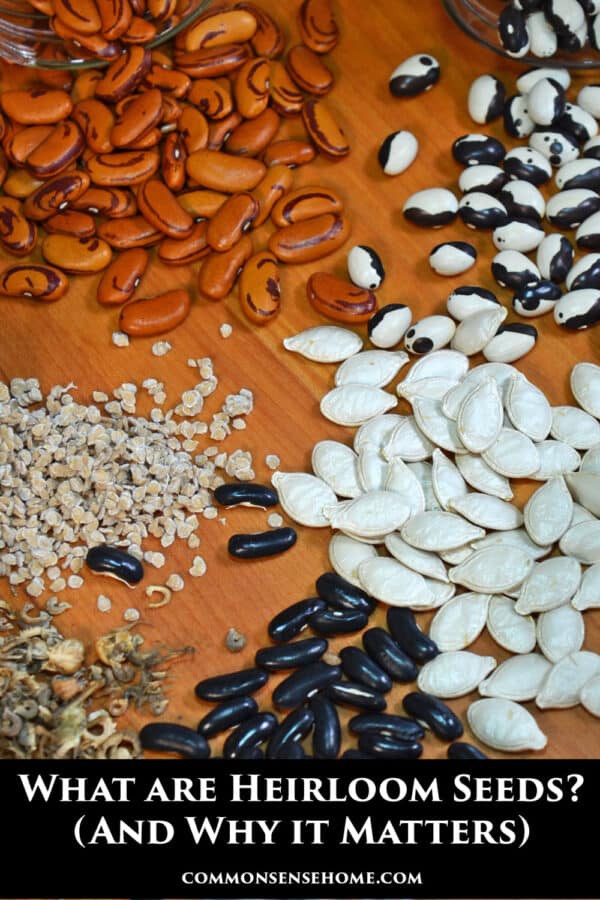

This article is written by Laurie Neverman. Laurie and her family have 35 acres in northeast Wisconsin where they grow dozens of varieties of fruiting trees, shrubs, brambles, and vines, along with an extensive annual garden. Along with her passion for growing nutrient dense food, she also enjoys ancient history, adorable ducks, and lifelong learning.

